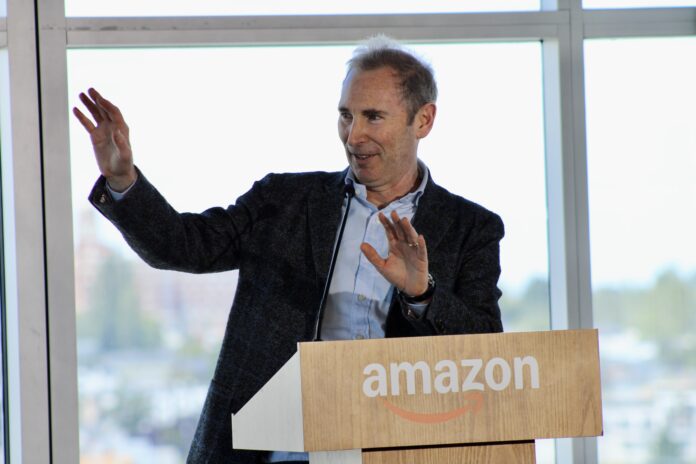In a controversial move that has stirred employee dissatisfaction, Amazon recently introduced a mandate requiring employees to work in the office five days a week. The new policy, announced in September, replaces Amazon’s previous hybrid arrangement, which only required three in-office days each week. CEO Andy Jassy has publicly addressed concerns and rumors surrounding the decision, as more than 500 Amazon Web Services (AWS) employees have voiced opposition, questioning the need for the change and urging a return to flexible work.
Defending the Decision: “No Backdoor Layoff”
Since the new mandate was rolled out, employees have speculated about its underlying motivations, with some questioning if it is part of a strategy to reduce the workforce or meet external demands. Jassy, however, categorically denied these claims, dismissing them as baseless.
“A number of people I’ve seen theorize that the reason we were doing this is a backdoor layoff or that we made some sort of deal with the city, or cities, and that’s why we were having people come back and be together more often,” Jassy explained. “I can tell you both of those are not true,” he added, clarifying that The Company’s focus is on encouraging greater in-office collaboration to support productivity and innovation.
Employee Resistance and the Call for Flexibility.
Despite Jassy’s explanation, Amazon employees have expressed strong discontent. Employees argue that remote or hybrid work has proven to be equally effective in maintaining productivity, and many believe Amazon should be leading in flexible work practices rather than rolling them back. This sentiment was formalized in a collective letter signed by over 500 AWS staffers, where employees challenged the necessity of a five-day, in-office mandate.
“We urge you to reconsider your comments and position on the proposed 5-day in-office mandate,” the letter stated. “Remote and flexible work is an opportunity for The Company to take the lead, not a threat. We want to work for a company and for leaders that recognize and seize this moment to challenge us to reinvent how we work,” it continued.
The employee response reflects a broader trend in the tech industry, where flexible work has become a standard since the pandemic. With many employees preferring hybrid or remote arrangements, they see Amazon’s new policy as a regressive move, which runs counter to evolving workplace dynamics in the tech sector and beyond.

The Impact on Amazon’s Workforce.
The new policy comes on the heels of considerable downsizing within Amazon, with reports indicating that the company has already laid off 27,000 employees since 2022. This backdrop has fueled employee suspicions that the five-day in-office mandate could be an indirect cost-cutting measure designed to push workers to resign voluntarily, thus reducing headcount without additional layoffs. While Amazon has stated that the policy is not a “backdoor layoff,” concerns persist, with some employees speculating that the in-office mandate may compel those who prefer flexible work to leave.
In response to concerns about added commuting costs, Amazon has introduced several support measures aimed at making the transition more manageable. These include access to free shuttles, subsidized parking, reimbursable public transit costs, and subsidized options for ridesharing and biking. However, many employees remain unconvinced, viewing these measures as insufficient to address the underlying preference for remote or hybrid work. As it stands, Amazon employees are expected to comply with the new mandate by January 2, 2024, or face potential repercussions, though specifics on enforcement remain unclear.
Flexible Work: A Missed Opportunity or a Management Necessity?
Amazon’s mandate also touches on a larger debate within the corporate world about productivity, collaboration, and the future of work. Proponents of the five-day in-office requirement argue that physical presence fosters deeper teamwork, faster communication, and a culture of accountability. By this logic, bringing employees back to the office five days a week is viewed as a means of reviving Amazon’s traditional office culture and accelerating the pace of innovation, particularly within AWS, one of the company’s most significant revenue streams.
However, employees advocating for remote or hybrid options believe the policy misses an opportunity for Amazon to redefine workplace norms in the post-pandemic landscape. They argue that flexible work arrangements are essential for the retention and recruitment of talent in a competitive tech industry. With other major tech companies allowing more leeway in terms of remote work, critics suggest that Amazon’s approach may impact its ability to attract and retain top talent, especially as employees increasingly prioritize flexibility and work-life balance.
A Divided Workplace: What Lies Ahead?
As Amazon moves forward with its five-day in-office mandate, the rift between leadership and staff on this issue remains evident. Employees advocating for flexible work arrangements emphasize that a rigid, one-size-fits-all policy may not align with Amazon’s broader vision of innovation and adaptability. Meanwhile, Jassy’s defense of the policy underlines Amazon’s commitment to in-person collaboration, which he views as critical for long-term growth and cohesion.
This policy shift at Amazon encapsulates a dilemma facing many organizations grappling with the realities of remote work. Should companies prioritize traditional office settings to maintain close-knit teamwork, or should they adapt to the new normal of remote work, which many employees find empowering and productive? For Amazon, this decision may impact not only the work environment but also the company’s cultural identity and its approach to attracting and nurturing talent.
As the deadline for compliance approaches, it remains to be seen whether Amazon will adjust its stance or stick firmly to the five-day mandate. For now, Jassy’s message to employees is clear: Amazon’s new policy is a strategic choice, not a means to cut costs or appease external forces. But with employee pushback intensifying, it’s likely that this debate over in-office work versus flexibility will continue, both at Amazon and within the larger tech industry.


